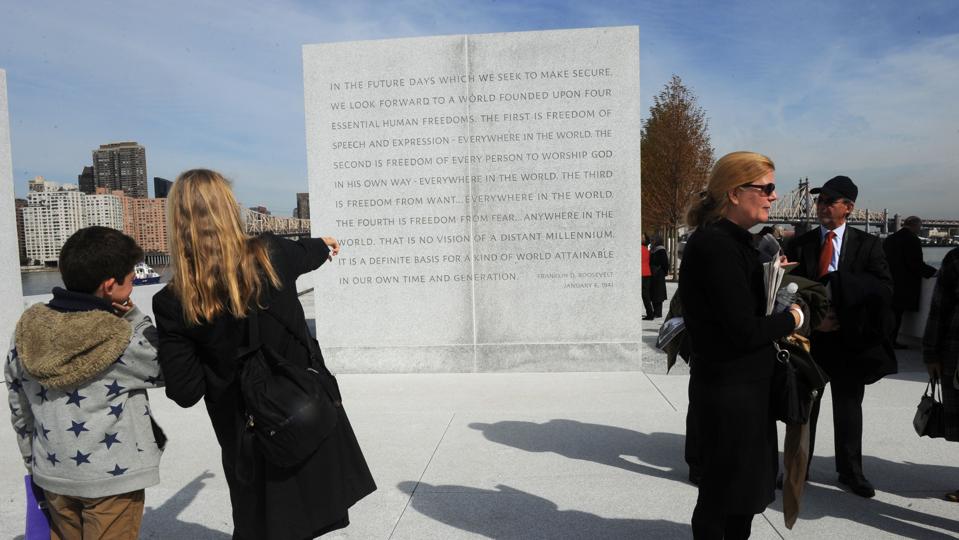The Covid-19 Pandemic And The Case For Healthcare As A Fundamental Freedom
Our nation is on a precipice, but we have been challenged before. Eighty years ago, the United States was on the cusp of a World War and politically divided following a highly contentious election.
On January 6th, 1941, President Franklin Delano Roosevelt delivered his State of the Union address rallying the country to fight the unprecedented threats of the day. He reminded the nation of the way of life and values that we were fighting to protect: freedom of speech, freedom of worship, freedom from want, and freedom from fear. We now remember this speech as the Four Freedoms.
Today, we are again challenged in generation-defining ways. With more than 350,000 Americans killed by Covid-19, and many more struggling financially, the pandemic’s impact has eclipsed many of our country’s darkest wartime moments. Our individual and national security have been fundamentally shaken while a leadership vacuum has fueled a deeper existential crisis across American institutions and communities.
The current moment demands a resolute voice and new principles to navigate these historic challenges. From FDR's Four Freedoms, our post-war history and policies formed a global network of alliances and partnerships, built a robust military and security apparatus, and fostered economic growth through policy and global cooperation.
If we desire a safe and prosperous future, we must recognize that health is not the outcome of our success, but rather its predicate. Health is fundamental to our ability not just to survive but to thrive. Given current threats, we need to embrace a fifth freedom — one rooted in health — to again unite our population and guide our nation.
While potential solutions in health are many, there are three immediate priorities: establish truly universal health care, place more health workers in the right places, and address the social roots of poor health.

An excerpt of FDR's speech at Four Freedoms Park in New York City.
DIANE BONDAREFF/INVISION/AP
To start, we must remedy the human suffering and financial toll that results when healthcare is a privilege afforded only to those who can pay. We must prioritize a rights-based approach to health, including Universal Health Care, joining other advanced economies in building economic growth through healthy populations. In 2019, American families borrowed $88 billion to pay for health care and employers lost more than $530 billion in lost productivity. Today, nearly 45% of Americans face no, under or gaps in insurance annually, leaving them vulnerable to catastrophic health costs that cascade to poverty; poor health and poverty go hand-in-hand in states that opted out of ACA expansion, for example.
Second, the U.S. must awake to the shortages in the health workforce, particularly in under-served regions of the country, including reservations and marginalized rural and urban communities. Economic incentives and debt repayment strategies should expand to ensure skilled health workers of all specialties and backgrounds are able and incentivized to practice across the U.S. We should proactively address communities most in need, where hospitals are closing, leaving many without affordable healthcare or hope.
Finally, we must build a health system that addresses the root causes of disease, building trust, and better outcomes with it. In addition to removing economic barriers, it is essential to reform our approach to the social determinants of poor health and ensure a healthcare system that rejects medicine’s legacy of racism and classism that has led to worse outcomes and, alongside, warranted mistrust among Black, Brown, Latinx, and Indigenous communities.
These principles have value and impact internationally too. The U.S. needs to re-engage in global cooperation and grow health alliances — starting with Covid-19. The U.S. and other wealthy nations’ approach of stockpiling Covid-19 medicines and vaccines has not made us more protected or safe, also leaving most countries to negotiate for scarce remaining resources.
The U.S. opted out of COVAX, the Covid-19 vaccine consortium aimed at saving billions of lives and helping to restart the global and connected economy. President-elect Biden has observed that Covid-19 “must be beaten everywhere, or it comes back to haunt us again” and the novel variants emerging show that global engagement will be essential to beating a scourge that knows no borders or nationality.
Our nation is again on a precipice. Our leaders have a responsibility to determine — and our citizens to ask for — a bold vision and agenda: to lead through health and move us beyond the pandemic to a prosperous and secure future, with the freedom of health as a first principle.
